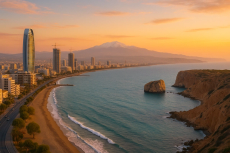Blog • Published on:December 16, 2024 | Updated on:February 18, 2025 • 11 Min
Tax Free Countries: Complete List of Zero Tax Nations in 2025
In an increasingly globalized world, individuals and businesses seek to minimize tax liabilities legally. Tax free countries, also known as zero-tax nations, offer attractive environments for optimizing financial obligations. This comprehensive guide explores the concept of tax free countries, highlights top destinations for relocation, and provides insights into tax advantages and strategic planning.
Understanding Tax Free Countries and Zero Tax Jurisdictions
Defining Tax Free Nations
Tax free countries are sovereign states that do not impose certain types of taxes on individuals or corporations. This can include the absence of personal income tax, corporate tax, or capital gains tax. These nations typically generate revenue through alternative means such as natural resource exports, tourism, or government-managed wealth funds.
Difference Between Tax Havens and Tax Free Countries
While both tax havens and tax free countries provide significant tax advantages, they operate differently. Tax havens are jurisdictions with low or no taxes and financial secrecy, attracting individuals seeking to reduce taxable income. Conversely, tax free countries maintain transparent systems and openly provide tax exemptions to encourage residency and business investments.
Examples of Tax Haven Countries:
- Switzerland
- Luxembourg
- Singapore
- Hong Kong
- Ireland
- Isle of Man
- Panama
- British Virgin Islands
- Bermuda
- Liechtenstein
Tax havens often prioritize financial secrecy and offer structures that enable global corporations or individuals to shield assets. These jurisdictions are commonly used for complex financial planning and asset management.
Types of Taxes Typically Exempted
Tax free nations often exempt individuals and businesses from the following taxes:
- Personal Income Tax: No tax on individual earnings.
- Corporate Tax: No taxation on business profits.
- Capital Gains Tax: No tax on income generated from investments.
- Inheritance Tax: Wealth transfer without government deductions.
Top Tax Free Countries for Relocation
1. United Arab Emirates (UAE)
The UAE, particularly cities like Dubai and Abu Dhabi, has become synonymous with a tax free lifestyle. While there is no personal income tax, the UAE has introduced a corporate tax of 15% for certain business sectors, making it a prime destination for expatriates and businesses. Its strategic location, world-class infrastructure, and ease of business setup further enhance its appeal.
2. Monaco
Monaco, a European microstate, imposes no personal income tax and boasts a high standard of living. With a stable economy driven by tourism, banking, and real estate, Monaco is an attractive destination for high-net-worth individuals (HNWIs).
3. Bahamas
The Bahamas is a renowned tax free country, exempting residents from income, capital gains, and inheritance taxes. The nation relies on tourism and offshore financial services to sustain its economy, offering a relaxed lifestyle with stunning beaches.
4. Bermuda
Bermuda’s tax advantages include no personal income tax or capital gains tax. Its robust economy, driven by insurance and reinsurance industries, makes it a favorite for financial professionals.
5. Cayman Islands
Known for its absence of personal income, corporate, and capital gains taxes, the Cayman Islands is a leading financial hub. Its tropical climate and business-friendly policies attract expatriates worldwide.
6. Brunei
Brunei’s economy, supported by oil and gas exports, allows it to forgo personal income tax. It offers a high standard of living, extensive social programs, and a safe environment.
Living in Tax Free Nations: Requirements and Considerations
Residency Requirements
Each tax free country has specific residency requirements. These may include physical presence criteria, property investments, or financial thresholds. Understanding these regulations is essential to maintaining your residency status
United Arab Emirates (UAE)
- Residency by Investment: The UAE offers residency visas also known as Golden Visa through real estate investment. Applicants must invest in property with a minimum value of approximately USD 270,000. This grants a renewable residency visa, typically valid for three years.
- Residency by Employment: Securing employment in the UAE allows for residency sponsorship by the employer. The visa's validity aligns with the employment contract duration.
Monaco
- Residency by Financial Means: Applicants must demonstrate sufficient financial means to support themselves. This includes a minimum bank deposit (often exceeding USD 500,000) in a Monaco bank and securing accommodation in the principality. The initial residency permit is typically valid for one year and can be renewed annually.
Bahamas
- Permanent Residency by Investment: An investment in real estate with a minimum value of USD 750,000 qualifies an individual for permanent residency. Processing is expedited for investments of USD 1.5 million or more.
- Annual Residency Permit: For those not seeking permanent residency, an annual permit is available for a fee of approximately USD 1,000, allowing residency without the right to work.
Bermuda
- Residency Certificate for Property Owners: Individuals purchasing property valued at a minimum of USD 2.5 million can apply for a Residential Certificate, granting residency rights.
- Work Permit: Employment in Bermuda allows for residency, with the employer sponsoring the work permit.
Cayman Islands
- Permanent Residency by Investment: Investing a minimum of USD 1.2 million in developed real estate, with at least USD 600,000 in land or property, qualifies an individual for permanent residency. Additionally, the applicant must demonstrate an annual income of at least USD 150,000 without the need for employment within the Cayman Islands.
Brunei
- Limited Residency Options: Brunei does not offer formal residency-by-investment programs. Residency is typically granted through employment, particularly in sectors where local expertise is limited. Applicants must secure a job offer from a Brunei-based employer to obtain a work visa and residency permit.
Business Setup Options
Establishing a business in tax-free countries offers significant advantages, including reduced tax burdens and streamlined regulatory environments. Below is an overview of business setup options in select tax-free jurisdictions:
United Arab Emirates (UAE)
- Free Zones: The UAE hosts numerous Free Zones, such as the Dubai Multi Commodities Centre (DMCC) and Jebel Ali Free Zone (JAFZA), offering 100% foreign ownership, no personal or corporate taxes, and full repatriation of profits. Businesses operating within these zones benefit from simplified setup procedures and access to state-of-the-art infrastructure.
- Mainland Companies: Establishing a business on the UAE mainland allows access to the local market but typically requires a local sponsor holding 51% ownership. However, recent reforms permit 100% foreign ownership in specific sectors. Corporate tax is set at 15% starting 2025 for taxable income exceeding AED 375,000, with exemptions for certain sectors.
Monaco
- Service and Commercial Enterprises: Monaco offers a favorable environment for service-oriented businesses and commercial enterprises. While there is no personal income tax, companies generating more than 25% of their turnover outside Monaco are subject to a corporate tax rate of 33.33%. The principality provides a stable economic and political climate, attracting high-net-worth individuals and businesses.
Bahamas
- International Business Companies (IBCs): The Bahamas allows the formation of IBCs, which benefit from no corporate income tax, capital gains tax, or withholding tax. These entities are ideal for international trade, asset protection, and financial services. The incorporation process is straightforward, with no minimum capital requirements.
Bermuda
- Exempted Companies: Bermuda offers the option to establish Exempted Companies, which are exempt from local taxes on profits, income, or dividends. These companies can conduct business internationally but are restricted from trading within Bermuda. The jurisdiction is renowned for its robust legal framework and is a leading center for insurance and reinsurance industries.
Cayman Islands
- Exempted Companies: The Cayman Islands facilitate the incorporation of Exempted Companies, which are not subject to corporate taxes. These entities are commonly used for investment funds, international financing, and holding companies. The Cayman Islands are recognized for their strong financial services sector and confidentiality laws.
Brunei
- Limited Business Opportunities: Brunei does not have a specific regime for offshore companies. Business activities are primarily focused on the domestic market, with significant government involvement in the economy. Foreign investment is encouraged in sectors like halal manufacturing, tourism, and information technology, with various incentives provided to investors.
When considering establishing a business in these jurisdictions, it's essential to conduct thorough due diligence and consult with legal and financial advisors to ensure compliance with local laws and international regulations.
Banking Regulations
Banking regulations in tax free countries are designed to attract international businesses and individuals while ensuring compliance with global standards. Here are the banking options in these jurisdictions:
United Arab Emirates (UAE)
The UAE offers a robust banking sector with internationally recognized banks. Non-residents can open accounts, but proof of residency enhances access to full banking services. Compliance with Anti-Money Laundering (AML) and Know Your Customer (KYC) regulations is strictly enforced.
Monaco
Monaco's banking system is tailored for high-net-worth individuals, offering private banking and wealth management services. Banks require proof of substantial funds and valid residency permits for account setup. The principality adheres to European banking standards for transparency.
Bahamas
Offshore banking in the Bahamas provides tax advantages and financial privacy. International Business Companies (IBCs) commonly use local banks. Stringent AML regulations are in place to comply with global financial standards.
Bermuda
Bermuda's banking sector specializes in financial services for insurance and reinsurance industries. Opening accounts requires a local presence or residency. Regulations align with international financial frameworks to prevent fraud.
Cayman Islands
Renowned for offshore banking, the Cayman Islands offers a secure environment for asset management and investment. Banks require significant documentation for account opening, including proof of source of funds. Regulations focus on compliance with international AML laws.
Brunei
Banks in Brunei cater to residents and expatriates, offering basic and private banking services. Strict banking laws ensure compliance with local and international standards. Residency is often required for opening accounts.
Cost of Living in Tax Free Countries
When considering relocation to tax-free or low-tax countries, it's essential to evaluate the cost of living, as it can significantly impact your financial planning. Factors such as housing, healthcare, and lifestyle preferences should be considered before relocation.
Tax Free vs. Low Tax Countries: Making the Right Choice
While tax free countries eliminate taxes entirely, low-tax jurisdictions may offer lower rates on specific tax categories. Weighing the benefits of both options depends on individual goals, financial circumstances, and long-term plans.
Comparison of Options
- Tax Free: Ideal for individuals prioritizing complete tax elimination.
- Low Tax: Suited for those seeking reduced yet structured taxation.
Pros and Cons between Tax Free and Low Tax Countries
Tax Free Countries
Pros
- Complete Tax Relief: Individuals and businesses benefit from zero personal income tax, corporate tax, and capital gains tax in most cases.
- Simplified Financial Planning: With fewer tax obligations, managing finances becomes more straightforward.
- Attractive for High-Net-Worth Individuals (HNWIs): Tax free countries often cater to affluent individuals with premium lifestyle options and investment opportunities.
- Global Business Opportunities: These countries often position themselves as international business hubs, offering strategic locations and ease of trade.
Cons
- High Cost of Living: Countries like Monaco and the Cayman Islands come with steep living costs, making them less accessible for middle-income individuals.
- Residency Challenges: Strict residency requirements or high investment thresholds can limit access for some.
- Limited Economic Diversity: Some tax free nations depend heavily on single industries (e.g., tourism or oil), making them vulnerable to economic fluctuations.
- Banking and Compliance Requirements: High levels of scrutiny under AML and KYC regulations can complicate financial transactions.
Low Tax Countries
Pros
- Moderate Tax Relief: Reduced tax obligations while maintaining access to robust infrastructure and economic stability.
- Greater Accessibility: Lower investment thresholds compared to tax free nations make these options more inclusive.
- Economic Stability: Low tax countries like Portugal and Malta offer diversified economies and stable governance.
- Residency Incentives: Many offer residency and citizenship programs with flexible pathways.
Cons
- Partial Tax Obligations: Some taxes, such as VAT or social security contributions, still apply.
- Longer Residency Timelines: Some low tax countries may require extended physical presence to secure permanent residency or citizenship.
- Complex Tax Rules: Navigating tax codes in low tax countries can be challenging, especially for foreign investors.
- Potential Policy Changes: Tax laws may change, impacting long-term financial planning for residents.
Investment Requirements for residency
Many tax free and low-tax countries require financial commitments to secure residency. Here is a list of notable countries and their investment requirements:
United Arab Emirates (UAE)
Investment in real estate or business setup, with a minimum threshold starting at USD 270,000.
Portugal (Low Tax Country)
Portugal offers a Golden Visa program with a new fund investment option starting at USD 180,000, making it a flexible choice for investors.
Malta (Low Tax Country)
Malta residency program requires a minimum investment of USD 650,000 in government bonds, real estate, and donations to qualify for citizenship.
Monaco
Property acquisition or rental with annual costs of at least USD 540,000 and maintaining substantial bank deposits.
Bahamas
Investment in real estate starting at USD 750,000 to qualify for permanent residency.
Bermuda
Business investment of USD 2,500,000 or proof of significant financial resources.
Cayman Islands
Real estate purchase with a minimum value of USD 1,400,000.
Brunei
No specific residency-by-investment program; applicants often need substantial business or employment ties.
FAQs About Tax Free Countries
1. Are tax free countries legal to reside in?
Yes, provided you meet the residency requirements and comply with local laws.
2. Do tax free countries require a minimum stay?
Some nations impose physical presence requirements to maintain tax residency.
3. How do I relocate to a tax free country?
Immigration pathways include investment, employment, or business incorporation. Contact experts from investment migration firms like Savory & Partners, who simplify the process, ensuring compliance with local laws and regulations, and tailoring strategies to fit individual needs.
4. Are there costs associated with living in tax free countries?
Yes, factors like housing and business setup can significantly impact costs.
References
World Bank. (2024). “Country Tax Policies and Economic Outlook.” Retrieved from https://www.worldbank.org
OECD. (2023). “Global Taxation Overview and International Compliance.” Retrieved from https://www.oecd.org
IMF. (2024). “Tax Systems in Emerging Economies.” Retrieved from https://www.imf.org
United Nations Development Program. (2024). “Sustainable Revenue Models in Tax Free Nations.” Retrieved from https://www.undp.org
Financial Times. (2024). “Global Banking Trends in Tax Free Jurisdictions.” Retrieved from https://www.ft.com
World Bank. (2024). “Country Tax Policies and Economic Outlook.” Retrieved from https://www.worldbank.org
Expat Money. (2024). “Top Countries for Tax Residency in Less Than 183 Days.” Retrieved from https://expatmoney.com
BBC News. (2024). “Top Tax Free Destinations for Expats.” Retrieved from https://www.bbc.com
Written By

Alice Emmanuel
Alice Emmanuel is an expert in residency and citizenship by investment, specializing in government compliance and program optimization. With over 8 years of experience, she has guided high-net-worth individuals through acquiring global mobility and new citizenships, particularly in Europe, the Caribbean, and the Middle East. Alice's in-depth knowledge of Middle Eastern residency programs makes her a trusted advisor for investors seeking security and diversification in the region.
Related Articles









Recently Published









Book a free consultation


